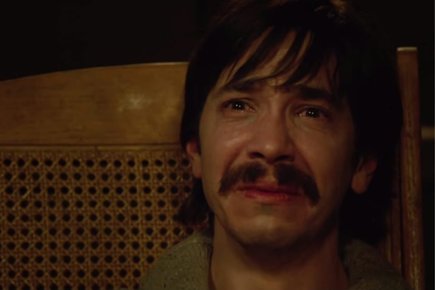D | An abrasive podcaster undergoes a horrific transformation in isolated Canada. Directed by Kevin Smith Starring Justin Long and Michael Parks Initial Review by Jon Kissel |

The character of Wallace Bryton (Justin Long) is what damns Tusk to irritation and indifference. It’s all well and good for a horror film to set up an unlikable protagonist to suffer a painful comeuppance. If that tactic callously absolves the viewer of their bloodlust, at least there’s a long tradition in horror of exactly that. Tusk goes too far in creating a person too awful to believably move through the world, turning Bryton into a walking ball of traits that would prevent him from doing what the film says he does. It’s impossible to believe that anyone would submit to an interview from this guy. He wears a disdain for everyone on his sleeve to the point where he has anti-charisma, a poisonous trait compounded by the grating and unfunny scenes of his supposedly-successful podcast. He arrogantly doesn’t calibrate himself to who he’s talking to, and he’s a well-read and knowledgeable person who willfully chooses to speak in the coarsest and basest terms possible. Again, it’s fine for a horror film to have an unlikable protagonist, but they still have to exist in a recognizable world. Bryton doesn’t, and he’s a black hole in the center of Tusk.
The protagonist is the film’s implacable stumbling block, and his disagreeable presence puts me on guard for every other annoyance, of which Tusk has many. There’s a scene in the Sopranos where Christopha is doing an improv scene for his acting class, and his partner, who’s carrying imaginary oranges, puts his hands in his pocket, prompting Christopha to say ‘you’re dropping your fucking oranges.’ Despite this tiny win, ol’ Chrissy is not a good actor, but he’s got a better sense of surrounding than Smith in the scene at the airport customs desk, where Bryton and the agent have a long conversation while I’m busy thinking about the people patiently waiting in line for this hacky back-and-forth to wrap up. A small thing, but when I’m so put off by Bryton, the small things stand out. A bigger niggle is the idea that Bryton’s girlfriend Ally (Genesis Rodriguez) is having an affair with Haley Joel Osment’s Teddy. A woman that looks like that is not trading one greasy nerd for another. The film’s biggest laugh moment comes during Ally’s to-the-camera tearful monologue when Teddy’s hairy mitt lands on her cheek. This relationship is a bridge too far in a film about hammering walrus tusks into a jerk’s upper jaw.
Then, there’s gimmick cameos, of which Johnny Depp is the biggest offender. Even if I was enjoying Tusk up to his entrance, my enjoyment would have abruptly ceased. The vacillating tone between his discursive stories that are meant to be funny and the squishy eating his character does, as if he doesn’t have enough eccentricities already, are just the tip of the iceberg with him. Maybe I’m just sensitive to negative portrayals of the French or the French-adjacent. One wonders how Smith got Depp to appear in this lark/film, and then one notices in the credits that the gas station attendants are played by Depp’s and Smith’s daughters, and that Tusk turns into a spin-off with them starring in the panned Yoga Hosers a few years later. Jay and Silent Bob, these two are not. As if Tusk didn’t have enough clouds around its origin, there’s also a nepotism angle to make the experience next to useless.
The saving grace is Michael Parks, who Smith is developing a strong working relationship with. Parks’ pastor in the underrated Red State is better, but his walrus fetishist is the only thing holding Tusk together. He’s reasonably credible as a man with a shattered moral compass thanks to the very real and enraging story of the Duplessis Orphans, a pre-Vatican II molestation scandal that puts the lie to the vicious slander that child rapists only emerged when the church took a more lenient stance on admittig gay priests. Tusk tiptoes up to meaning with Howard Howe’s mania. He’s a man who suffered mightily from a crime that was never meaningfully prosecuted, and he transferred, at least in his mind, that sin onto Mr. Tusk when he killed and ate him. In a warped way, he’s trying to punish himself by recreating his greatest transgression and hoping that it goes a differently. It’s not clear why Bryton succeeds where so many others have failed, but this is a film that insults its viewers for being manipulated with commentary under the credits, so who cares.
I can already hear the coming podcast in which I’m told, like with Free Fire, that I shouldn’t expect meaning in every movie, especially a movie in which Justin Long is sewn into a walrus suit. I would be more inclined to agree if Smith wasn’t so aggressively aiming for pathos, only to laugh at anyone that it might’ve worked on. There’s a whiff of the Producers here, or some other kind of story where the creators have utter disdain for their audience, and Smith doesn’t hide from it. He seems like too open of a guy to do something so false and mercenary, and I wish he would use what talent he still has on something with a shred of legitimacy. D+
 RSS Feed
RSS Feed